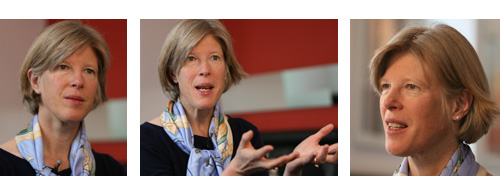Prof. Cynthia Kenyon, PhD
Director of the Hillblom Center for the Biology of Aging at UCSF

Interview of February 28, 2008 with Dr. Birgit Teichmann
“A life, twice as long, would be wonderful”
Biochemist Cynthia Kenyon has found the key for eternal youth – at least with the round worm it is in its genes.
Cynthia Kenyon is convinced, that the men soon may live to be 150 years old. Her research on the round worm has demonstrated, that the process of aging can be manipulated genetically. If only one single gene of his total 20 000 genes is changed, the worm lives twice as long. But can this mechanism be transferred to humans? Cynthia Kenyon is pursuing this question since the past 15 years. She has received numerous prices for her research successes. At the Heidelberg Forum for Bioscience, she talked about a new world that may soon be populated by wrinkle free and healthy centenarians.
You have found out already in 1993 that aging is a genetically controllable process. When can we expect the anti-aging-pill on the market?
It takes very long, to find out if the same molecular mechanism, which influences aging in the tiny round worm, can also be applied to higher organism. For that some experiments on mammals are necessary. On top of that we have to interest scientists and the pharmaceutical industry to do research in that direction, even though some pharmaceutical companies are already testing the first anti-aging products. If these pills should be available, naturally it will take a long time before they show their effectiveness.
You are a pioneer in aging research. How did you decide on this subject?
At the beginning of my career, it was assumed that aging is an irreversible process. During my studies, it became obvious to me, that this topic was abandoned too early. I realized the different life spans of animals. Whereas a rat lives three years, a squirrel has a life span of 25 years. I understood that the secret is in the genes. My interest was also of personal nature, since I grew older.
Would you really like to live to be 150 years old?
When you like youth, like to stay active and dynamic, then a life twice as long is simply wonderful. For me it would be fantastic. You are talking about a 90 year old looking and feeling like a 40 year old.
But over population is already a big problem.
For the world population this would be a challenge. But we already have a problem with the birth rate in many countries in the world and we must control it better. When each of us lives longer, we have to control it even more. On the other hand think about the advantages. A longer life experience opens new perspectives with the problems of the world.
But the higher the age, the more susceptible we become for cancer and Alzheimer.
Changes on certain genes prolong not only the aging process, but also delay typical age diseases. Some of these genes kill bacteria or are able to neutralize the effect of free radicals, which destroy the cell and tissue structure. We do not know the molecular basics yet to the detail, but we suspect that the same gene indeed can prevent certain diseases.
Your research deals mainly with the round worm. Do you plan experiments with mammals?
The advantage of the round worm is its simple structure: the animal consists of
1 000 cells. In comparison, the human organism consists of billions of cells. So far we have identified about 100 genes, which influence the aging process. We know already that these genes function similar with mammals and mice.
How did your scientific research influence your life style?
In our experiments we have found out, that some aging genes are connected to the function of hormones, one being the insulin, which is responsible for the decomposition of carbohydrate. Round worms with a constantly high insulin level age faster. Therefore I have changed my diet and do without any nutrition high on carbohydrates like potatoes, rice, bread or noodles. I don’t even buy any sweets any more and instead I eat vegetables.
Personal Data
Cynthia Kenyon graduated valedictorian in chemistry and biochemistry from the University of Georgia, USA, in 1976. She received her PhD from MIT in 1981, where, in Graham Walker’s laboratory, she was the first to look for genes on the basis of their activity profiles, discovering that DNA damaging agents activate a battery of DNA repair genes in E. coli. She then did postdoctoral studies with Nobel laureate Sydney Brenner at the MRC Laboratory of Molecular Biology in Cambridge, UK, studying the development of C. elegans.
Since 1986 she has been at the University of California, San Francisco, where she was the Herbert Boyer Distinguished Professor of Biochemistry and Biophysics and is now an American Cancer Society Professor. In 1993, Dr. Kenyon’s discovery that a single-gene mutation could double the lifespan of C. elegans sparked an intensive study of the molecular biology of aging. Dr. Kenyon's findings have now led to the discovery that an evolutionarily-conserved hormone signaling system controls aging in other organisms as well, including mammals.
Kenyon has received many honors, including the King Faisal Prize for Medicine, the American Association of Medical Colleges Award for Distinguished Research, the Ilse & Helmut Wachter Award for Exceptional Scientific Achievement, La Fondation IPSEN Prize, and the Inspire Award from the AARP. She is a member of the US National Academy of Sciences, the American Academy of Arts and Sciences, and the US Institute of Medicine, and she has received an honorary doctorate from the University of Paris. She is now the director of the Hillblom Center for the Biology of Aging at UCSF.


